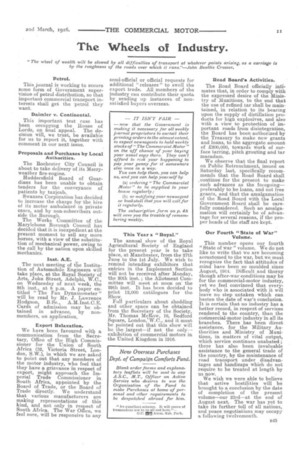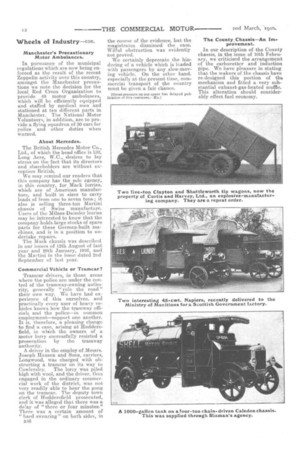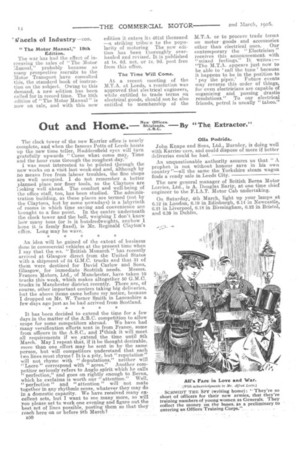The Wheels of Industry.
Page 11

Page 12

Page 14

If you've noticed an error in this article please click here to report it so we can fix it.
" The wheel of wealth will be slowed by all difficulties of transport at whatever points arising, as a carriage is by the roughness of the roads over which it runs."—John Beattie Crozier.
Petrol.
This journal is working to secure some form of Government supervision of petrol distribution, so that important commercial transport interests shall get the petrol they want.
Daimler v. Continental.
This important test ease has been occupying the House of Lords, on final appeal. The decision will, we trust, be available for us to report it, together with comment in our next issue.
Proposals and Purchases by Local Authorities.
The Rochester City Council is about to take delivery of its Merryweather fire-engine. Huddersfield Board of Guardians has been unable to obtain tenders for the conveyance of patients by taxicab. Swansea Corpbra.tion has decided to increase the charge for the hire of its motor arrnbulanci in private cases, and by non-subscribers outside the Borough. The Works Committee of the Marylebone Borough Council has decided that it is inexpedient at the present moment to sell any more horses, with a view of the substitution of mechanical power, owing to the call by the nation upon skilled mechanics.
Inst. A.E.
The next meeting of the Institution of Automobile Engineers will take place, at the Royal Society of Arts, John Street, Adelphi, W.C., on Wednesday of next week, the 8th inst., at 8 p.m. A paper entitled "The Fan Dynamometer" will be read by Mr. J. Lawrence Hodgson, B.Sc., A.M.Inst.C.E. Cards of admission may be obtained in advance, by nonmembers, on application.
Export Relaxation.
We have been favoured with a communication from the Secretary, Office of the High Commissioner for the Union of South Africa (32, Victoria Street, London, S.W.), in which we are asked to point out that any members of the motor industry, who feel that they have a grievance in respect of export, might approach the Imperial Trade Commissioner in South Africa, appointed by the Board of Trade, or the Board of Trade directly. We understand that various manufacturers are making representations of this kind, and not only in respect of South Africa. The War Office, we feel sure, will be responsive to any
semi-official or official requests for additional " releases " to swell the export trade. All members of the industry can contribute their quota by sending up instances of nonsatisfied buyers overseas.
This Year s "Royal."
The annual show of the Royal Agricultural Society of England for the present year is to take place, at Manchester, from the 27th June to the 1st July. We wish to remind intending exhibitors that entries in the Implement Section will not be received after Monday, the 20th inst. ; the Allotment Committee will meet at noon on the 29th inst. It has been decided to print 12,000 catalogues for the Show.
Full particulars about shedding and other space can be obtained from the Secretary of the Society, Mr. Thomas MeRow, 16, Bedford Square, London,`W.C., and it must be pointed out that this show will be the largest—if not the only— exhibition of commercial motors in the United Kingdom in 1916. Road Board's Activities.
The Road Board officially intimates that, in order to comply with the expressed desire of the Ministry of Munitions, to the end that the use of refined tar shall be maintained, in relation to its bearing upon the supply of distillation products for high explosives, and also with a view to protection of important roads from disintegration, the Board has been authorized by the Treasury to make new grants and loans, to the aggregate amount of .2200,000, towards work of surface tarring, pitch grouting and tar macadam.
We observe that the final report on Public Retrenchment, issued on Saturday last, specifically recommends that the Road Board shall continue for the present to make such advances as the foregoing— preferably to be loans, and not free grants, and that the amalgamation of the Road Board with the Local Government Board shall be carefully considered. Such an amalgamation will certainly be of advantage for several reasons, if the proper heads of the staff are kept.
Our Fourth "State of War" Volume.
This number opens our fourth "State of war" volume. We do not like to write that we are becoming accustomed to the war, but we must recognize the fact that attitudes of mind have been so moulded since August, 1914. Difficult and thorny though after-war conditions may be for the commercial-motor industry, yet we feel convinced that everybody who is associated with it will leave no step untaken which can hasten the date of war's conclusion. It is certain that no industry has a better record, in respect of services rendered to the country, than the conimercial-motor industry in all its branches. There has been direct assistance, for the Military Authorities and Ministry of Munitions, in. matters of vital output, which service continues unabated ; there has also been invaluable assistance to the general trade of the country, by the maintenance of road transport underdisadvantages and handicaps which do not require to be treated at length by us now.
We wish we were able to believe that active hostilities will be brought to a conclusion by the date of completion of the present volume—our 23rd—at the end of August next. The war has yet to take its further toll of all nations, and peace negotiations may occupy a following twelvemonth.
Manchester's Precautionary Motor Ambulances.
In pursuance of the municipal regulations which are now being enforced as the result of the recent Zeppelin activity over this country, amongst the Manchester precautions we note the decision for the local Red Cross Organization to provide 40 motor ambulances, which will be efficiently equipped and staffed by medical men and stationed at ten different parts in Manchester. The National Motor Volunteers, in addition, are to provide a flying squadron of 30 cars for police and other duties when warned.
About Mercedes.
The British Mercedes Motor Co., Ltd., of which the head office is 132,
Long Acre, desires to lay stress on the fact that its directors and shareholders are without exception British. We may remind our readers that this company has the sole agency, in this country, for Mack lorries, which are of American manufacture, and built in sizes to carry loads of from one to seven tons; it also is selling three-ton Martini chassis of Swiss manufacture. Users of the Milnes-Daimler lorries may be interested to know that the company holds large stocks of spare parts for these German-built machines, and is in a position to undertake repairs.
The Mack chassis was described in our issues of 12th August of last year and 20th January, 1916, and the Martini in the issue dated 2nd September of last year.
Commercial Vehicle or Tramcar ?
Tramcar drivers, in those areas where the police are under the control of the tramway-owning authority, generally "rule the road" their own way. We have had experience of this ourselves, and practically every user of heavy vehicles knows how the tramway officials and the police—in common employment—support one another. It is, therefore, a pleasing change to find a case, arising at Huddersfield, in which the owners of a motor lorry successfully resisted a prosecution by the tramway authority.
A driver in the employ of Messrs. Joseph Hanson and Sons, carriers, Longwood, was charged with obstructing a tramcar on its way to Cowlersley. The lorry was piled high with wool, and the driver, thus engaged in the ordinary commercial work of the district, was not very readily able to hear the gong on the tramcar. The deputy town clerk of Huddersfield prosecuted, and it was alleged that there was a de!ay of "three or four minutes." There was a certain amount of " hard swearing" on both sides, in
B46
the course of the evidence, but the magistrates dismissed the case. Wilful obstruction was evidently not proved.
We certainly deprecate the hindering of a vehicle which is loaded with passengers by any slow-moving vehicle. On the other hand, especially at the present time, commerciat transport of the country must be given a fair chance.
1Great pros-sure on our space has delayed publication of this cornment.—En. I The County., Chassis—An Improvement.
In our description of the County chassis, in the issue of 10th February, we criticised the arrangement of the carburetter and induction pipe. We have pleasure in stating that the makers of the chassis have re-designed this portion of -am, mechanism and fitted a very substantial exhaust-gas-heated muffle. This alteration should considerably effect fuel economy.
"The Motor Manual," 19th Edition.
The war has had the effect of increasing the sales of " The Motor Manual," probably because so many prospective recruits to the Motor Transport have consulted this, the standard book of instruction on the subjeet. Owing to this demand, a new edition has been called for in record time. The 19th edition of "The Motor Manual" is now on sale, and with this new edition it enters it; 401st thousand —a striking tribute to the popularity of motoring The new edition has been thoroughly overhauled and revised. It is published at 1s. 6d. net, or Ls. 9d. post free from this office.
The Time Neill Come.
At a recent meeting of the M,T.A. at Leeds, resolution was approved that electrical engineers, while entitled to trade terms on electrical goods, should not be also entitled to membership of the M.T.A. or to procure trade terms on motor • goods and accessories other than electrical ones. Our contemporary the " Electrician" receives this announcement. with "mixed feelings." It writes :— "The M.T.A. appears just now to be able to 'call the tune' because it happens to be in the position to pay the piper.' Future events may reverse this order of things, for even electricians are capable of organizing and passing drastic resolutions." To our electrical friends, petrol is usually "taboo."




















